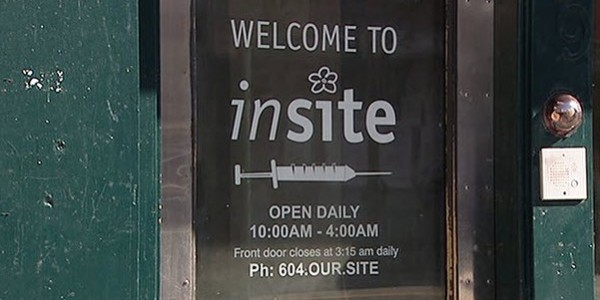Insite’s response to drug overdoses
Supervised injection services offer immediate intervention
The recent increase in drug-related overdoses and deaths has resulted in a provincial declaration of a public health emergency, along with heightened risk in vulnerable populations, particularly in the Downtown Eastside (DTES).
“The fear is definitely out there,” says Neil Arao, Mental Health and Substance Use Manager, Inner City Health Services. “People who are coming to Insite are looking for safety, even more so with the risks that have been presented by fentanyl.”
A busy service
Insite has been operating in the DTES since 2003. Clients access the service anonymously, and are independent in the administration of their own intravenous drugs. Individual booths are provided, which are monitored by staff through mirrored windows. After exiting their booth, clients can spend some time in the supervised “chill-out room” until they’re ready to head back outside. The constant supervision allows for immediate intervention in case of overdose. In the full 13 years of operation, Insite has never had one onsite death due to drug overdose.
“The service is busy from the time the doors open to close. We also have the statistics now available to show high periods of use. In November, opening time moved from 10 a.m. to 9 a.m. to help ease the initial line-up each morning, as part of the DTES 2nd Generation Strategy. Insite is also really busy for the couple days following delivery of social assistance cheques,” says Arao, noting that even a short wait time can result in the predominantly male clientele leaving and going back to the street to inject themselves.
Health Canada visit
Health Canada representatives visited Insite earlier this week and were impressed with the holistic approach to care and capacity to provide services to approximately 1,500 unique users. The Regional Managers from across Canada who toured the site also noted the continuum of services offered together: onsite detox and transitional housing along with Insite. At present, Toronto and Montreal, along with Vancouver, are planning additional supervised injection services and are working with Health Canada to obtain the required legal exemptions.
Opening more supervised injection services has been identified as part of VCH’s overdose response efforts. This work has also been informed by community consultation leading to the DTES 2nd Generation Strategy, which noted a need for better accessibility to supervised injection services, along with better integration of clinic-based care and outreach services. Additional services are being planned as part of more comprehensive health centres, rather than stand-alone clinics, and can offer clients an improved connection to other services and programs including primary care.
Insite works
“Our statistics show that people are also staying longer, which can increase wait times,” says Arao, in agreement with the opportunity to connect clients to other programs. “The private booths provide a safe and quiet space for a few minutes, in contrast to the constant noise on the streets.”
In the meantime, work continues to address the current overdose crisis, through the collection and use of emergency health care data to better target outreach, bad drug warnings, awareness campaigns and naloxone training and kit distribution.
Related links
http://supervisedinjection.vch.ca/
http://www.vch.ca/about-us/news/health-canada-grants-exemption-to-continue-to-run-insite

